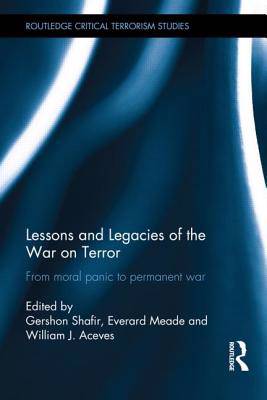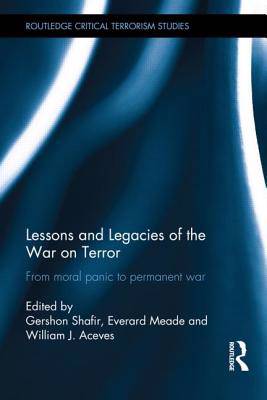
- Afhalen na 1 uur in een winkel met voorraad
- Gratis thuislevering in België vanaf € 30
- Ruim aanbod met 7 miljoen producten
- Afhalen na 1 uur in een winkel met voorraad
- Gratis thuislevering in België vanaf € 30
- Ruim aanbod met 7 miljoen producten
Lessons and Legacies of the War on Terror
From Moral Panic to Permanent War
Omschrijving
This volume examines the lessons and legacies of the U.S.-led "Global War on Terror," utilizing the framework of a political "moral panic."
A decade after 9/11, it is increasingly difficult to deny that terror has prevailed - not as a specific enemy, but as a way of life. Transport, trade, and communications are repeatedly threatened and disrupted worldwide. While the pace and intensity of terror attacks have abated, many of the temporary security measures and sacrifices of liberty adopted in their immediate aftermath have become more or less permanent.
This book examines the social, cultural, and political drivers of the war on terror through the framework of a "political moral panic" the exploration of threats to particular individuals or institutions that come to be viewed as threats to a way of life, social norms and values, civilization, and even morality itself. Drawing upon a wide range of domestic and international case studies, this volume reinforces the need for reason, empathy, and a dogged defence of principle in the face of terror.
This book will be of much interest to students of terrorism studies, human rights, U.S. foreign policy, American politics, and Security Studies and I.R. in general.
Specificaties
Betrokkenen
- Uitgeverij:
Inhoud
- Aantal bladzijden:
- 188
- Taal:
- Engels
- Reeks:
Eigenschappen
- Productcode (EAN):
- 9780415638418
- Verschijningsdatum:
- 30/11/2012
- Uitvoering:
- Hardcover
- Formaat:
- Genaaid
- Afmetingen:
- 156 mm x 233 mm
- Gewicht:
- 529 g

Alleen bij Standaard Boekhandel
Beoordelingen
We publiceren alleen reviews die voldoen aan de voorwaarden voor reviews. Bekijk onze voorwaarden voor reviews.










